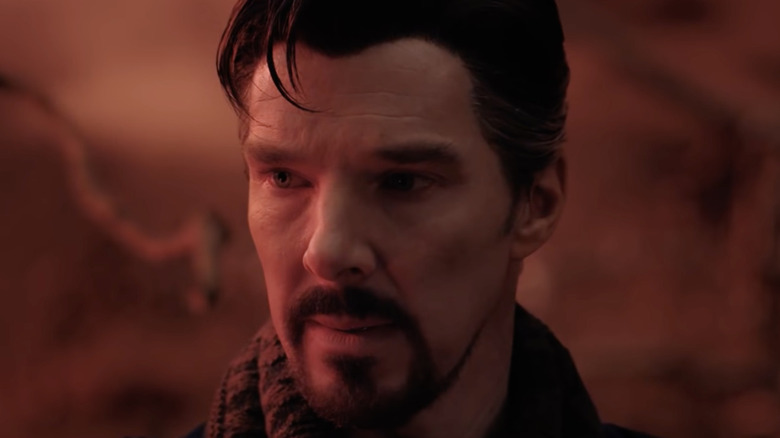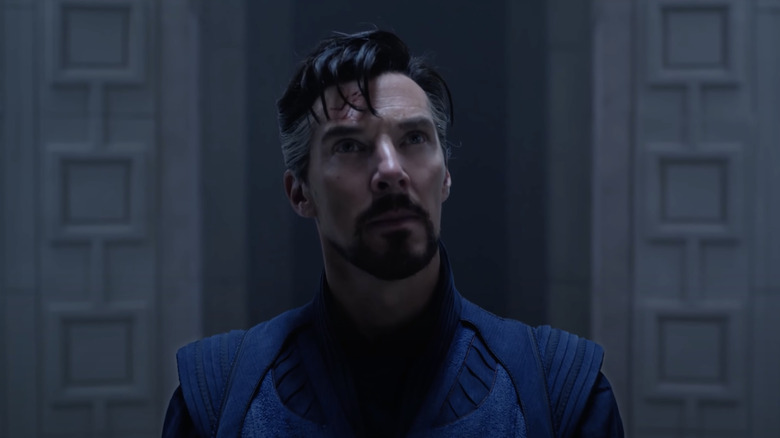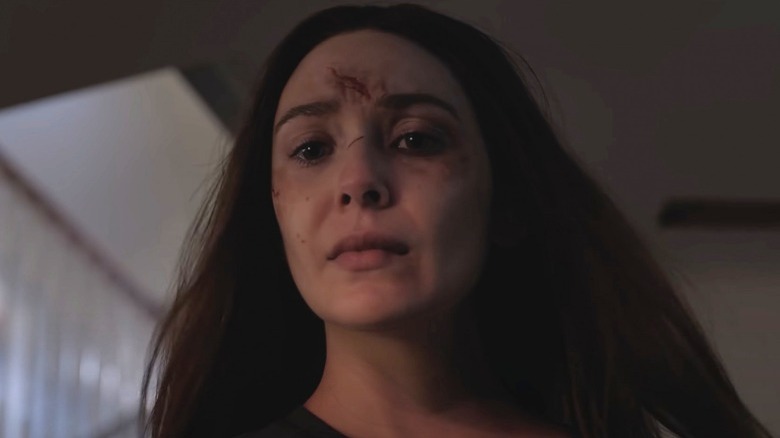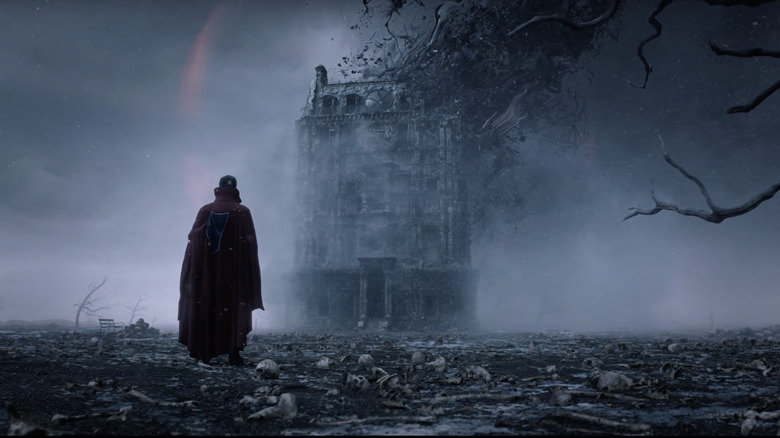The Doctor Strange In The Multiverse Of Madness Reviews Are Dead Wrong
Contains spoilers for "Doctor Strange in the Multiverse of Madness"
Marvel Studios has released the first of its major 2022 film releases in "Doctor Strange in the Multiverse of Madness," showcasing Stephen Strange (Benedict Cumberbatch) in his first Marvel Cinematic Universe solo adventure since the character's 2016 origin story. Strange and the MCU continue to explore the Multiverse in the new movie, vaguely picking up the overarching Multiverse thread introduced in the Disney+ series "Loki" and Strange's last appearance in "Spider-Man: No Way Home." Along for the ride is Wanda Maximoff (Elizabeth Olsen), who is fresh off her character's journey in "WandaVision," a complete newcomer to the MCU in teenage Multiverse traveler America Chavez (Xochitl Gomez), and more familiar faces in Sorcerer Supreme Wong (Benedict Wong) and Christine Palmer (Rachel McAdams).
Early reviews for the new movie have proven very positive. As of the publication of this article, the "Doctor Strange" sequel stands at 77% on Rotten Tomatoes, and 89% of audience members reported enjoying the film. Rotten Tomatoes even published a list of statistics about its Tomatometer ratings for the MCU; barring any changes, "Doctor Strange in the Multiverse of Madness" actually clocks in at a little less well-received than the average MCU film and TV series. While 77% approval is nothing to sneeze at for any movie and critics are heaping praise on Raimi's direction and a strong performance from Olsen to boot, the newest MCU entry is just plain messy at the end of the day.
Doctor Strange 2's cameos didn't learn anything from Spider-Man: No Way Home
Marvel Studios found that audiences at large responded ecstatically to the arsenal of cameos from past "Spider-Man" actors in 2021's "Spider-Man: No Way Home." The studio went so far as to reportedly reshoot aspects of the "Doctor Strange" sequel to include more cameos and capitalize on the excitement that the Multiverse could provide, but in doing so, Sam Raimi and Marvel failed to make its cameos matter to the story they're telling.
When Stephen Strange travels to Earth-838, he meets Reed Richards (John Krasinski), Charles Xavier (Patrick Stewart), Black Bolt (Anson Mount), and alternate universe versions of Captain Marvel (Lashana Lynch) and Captain Carter (Hayley Atwell). Richards' and Xavier's first appearances in the MCU should serve as a momentous occasion for Marvel Studios, but in their extremely limited screen time, they're not really the characters fans want to see.
"Spider-Man" brought back several specific characters from that franchise's past films and by and large continued their storylines, granting Otto Octavius (Alfred Molina) a chance at redemption and Andrew Garfield's Peter Parker closure after tragically losing his girlfriend in "The Amazing Spider-Man 2." Audiences have generally little familiarity with Reed Richards given the poor quality of past "Fantastic Four" movies, and the version Strange meets here is not Richards in any real sense of the word; it's just John Krasinski wearing a Halloween costume. The same logic applies to Professor X — if he's not the version seen in the "X-Men" trilogy, then who he is doesn't actually matter. He's not on-screen long enough for his character to matter.
Stephen Strange is overshadowed by the Scarlet Witch in his own movie
Stephen Strange has made quite the impact on the MCU for a character who is only now appearing in his second solo movie, six years removed from 2016's "Doctor Strange." Strangely, his presence in his own sequel film is overshadowed by the pure powerhouse that is Wanda Maximoff. The Scarlet Witch enters this film emboldened by her study of the Darkhold and made more desperate by losing the absurd, sitcom-addled reality she forces upon Westview in "WandaVision" to give herself an intact family. Wanda almost instantly reveals to Strange that she is the entity pursuing America Chavez through the Multiverse, immediately putting former allies at odds.
By the end of the movie, Strange showcases character growth as he learns that his intrinsic need for control has resulted in devastating consequences for other versions of himself. But by the time Strange's arc pays off in its climax, his journey has been usurped by Wanda's maddening quest to find a home in a universe where she has a family.
Wanda is shown partially destroying Kamer-Taj and possessing another universe's version of herself to destroy the Illuminati one by one before even tracking down the original source of the Darkhold. She ascends to the Scarlet Witch's throne after taking on the look and feel of a gory horror movie villain. Whatever happens with Strange in this movie proves far less interesting than Wanda's full-blown descent from hero to absolute villain, a rarity for the MCU as it closes in on 30 movies.
Doctor Strange 2's plot has more holes than the Multiverse
While the "Doctor Strange" sequel is receiving praise for Sam Raimi's direction, technical efforts, and Elizabeth Olsen's performance, it's hard to overlook the fact that its story really doesn't make any sense.
Strange's motivations to heroically go through the Multiverse and back to save America Chavez from Wanda's blinded-by-grief quest to take her universe-hopping powers are seemingly preempted by the recurring question of whether his sacrificing half the universe to Thanos was necessary; as Christine reminds Strange in the film's opening minutes, he is always the one holding the knife, whether it's in surgery or in life-or-death battle alongside the Avengers. Strange rises above this Multiversal fatal flaw by not killing America to ensure the Scarlet Witch's defeat in the movie's climax — instead, he puts his trust in America. America finds trust in him too, and it's actually America who sends the Scarlet Witch to a universe where she can physically be with her children.
There are a few problems: Wanda gets everything that she wants and ultimately beats herself when she realizes the terrifying consequences of trying to replace another universe's Wanda, making her goal truly impossible to obtain. America is the character who makes that all happen; for all Strange's efforts, he's left standing on the sidelines inside the corpse of an alternate version of himself, simply glad that things worked out in the end.



